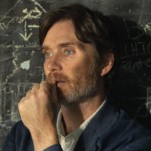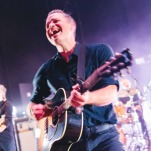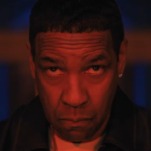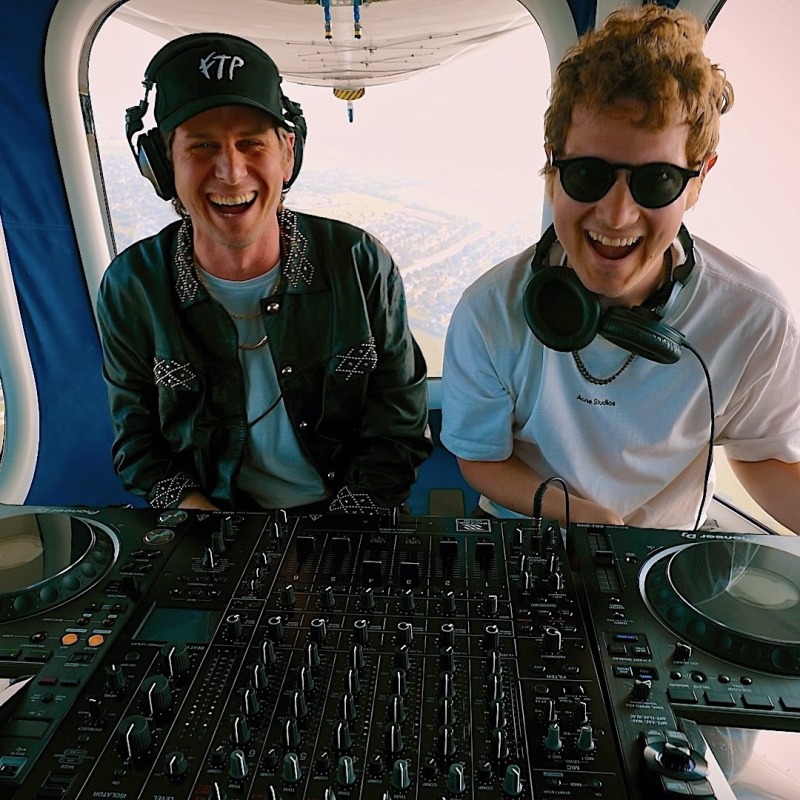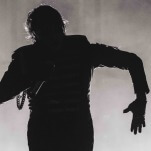The Armed Get Honest
The once-elusive post-hardcore collective from Detroit open up about how honesty, fearlessness and “being willing to look like a jackass” drive their latest, unexpected pivot on the arena-ready Perfect Saviors
Photo by Nate Sturley
“I think we’re the most honest people out there!” Tony Wolski proclaims about The Armed, not even 10 minutes into our interview. To those with even a passing knowledge of the enigmatic post-hardcore group from Detroit—known for employing everything from elaborate secrecy, pseudonyms, fictional cult-like figureheads and outright deception to operate in anonymity from their first release in 2009 up until 2021’s ULTRAPOP—that sentiment might register as a surprise. Here is a band that have become notorious for their antics in confusing music press over the years, sending members masquerading as “Dan Greene” in one interview and having one of their many ripped instrumentalists get a massage in another, now touting a commitment to openness and telling the whole truth for their latest album Perfect Saviors.
Wolski, one of The Armed’s vocalists, sees it as the next logical step for the band, saying, “I think the great irony is that we would assess that we’ve been being incredibly honest with our art for a long time.” Just as quickly, he interjects, as if he knows saying that might provoke skepticism. “But that sounds silly!” he exclaims, beaming widely. “I get it, and I don’t not get that dissonance. But the art itself has always been intensely honest. It’s just that the expression of that art is complex and involves a lot of smokescreens.”
Wolski has a point. For as much as the press surrounding The Armed has been about the mystique of a band whose scope and sound felt truly limitless, the music itself has always felt immediate, formidable and—for lack of a better word—truthful. From the pummeling hardcore riffs of Untitled to the glitchy, electro-pop-metalcore of Only Love, it’s always been easy to tell that The Armed’s music itself has been no joking matter. Even if you’re completely oblivious to the press escapades that dominate the group’s narrative, one listen of the sheer passion that goes into The Armed makes it clear what drives fans to pour unsolicited dollars into a Times Square billboard or tattoo the band’s logo onto their bodies at house shows.
“Our music is not fully ironic,” Wolski continues. “We’re trying to deliver some pretty sincere messages. If you’re constantly undermining your own reliability as a narrator, people think that you’re pranking them.” It only made sense to change the tactics with which they spoke about their music accordingly. Telling me nothing but the truth now, Wolski proclaims: “The anonymity has been outmoded. It’s become a contrivance and it’s become a hindrance to us delivering anything with sincerity.”
If anything, the most surprising thing about my interview with The Armed is how normal it is. After reading dozens of wildly varying past features on the project and preparing for truly anything (amplified further when I’m sent a Zoom invite with the participants’ names hidden), what occurs is a fairly typical conversation between Wolski—who was last seen claiming to be “Adam Vallely” during ULTRAPOP’s rollout—and Kenny Szymanski, Wolski’s cousin who most frequently plays bass in the band. It follows the standard rigors of music publicity: talk of the new album, reflections on the project as a whole and not a single detour into prankster chaos. True to form, The Armed have caught me off-guard yet again, only because my expectations skipped over the most obvious—and honest—possibility.
In reality, I should have seen this coming after listening to Perfect Saviors. Largely sidelining the blast beats and distorted screams that defined their breakout, The Armed make their boldest sonic pivot yet: their own twisted take on arena-ready rock, or alternative chart staples, while still inverted in a way only The Armed can pull off. Early album cuts like “FKA World” and “Clone” pair driving riffs against Wolski growling refrains like “I want to sell you lies”; elsewhere, Fuubutsushi saxophonist Patrick Shiroishi enters the band with dance-ready stutters, or even soaring mid-tempo passages that lull the listener into an unexpected state of tranquility. For the first time in who knows how long, it’s fairly easy to make out the words Wolski sings without a lyric sheet. Dare I say: It’s even got hooks in the way only great pop-rock can burrow into your head.
The sound became “the natural conclusion,” Wolski says, of what The Armed had been exploring on Only Love and ULTRAPOP, their last two records that traversed imposing pop structures on black metal, and vice versa. Where Only Love was meant to sound mixed as if “ten thousand leagues under the fucking sea” and ULTRAPOP took on the effect of “a bee in your ear,” Perfect Saviors represents the equilibrium between the two. To realize that, they called upon storied engineer Alan Moulder, whose work on “radio-ready music that shouldn’t be radio-ready” like Nine Inch Nails’ The Downward Spiral and The Smashing Pumpkins’ Mellon Collie and the Infinite Sadness made him appeal to The Armed’s aims. “It was that idea of, ‘What if we took these things that are still pretty challenging, but we gave it to a guy who was, against all odds, trying to make it as naturally palatable from a presentation standpoint as possible,’” Wolski elaborates. “We’ve been telling everyone we’re becoming an experimental pop band, and I think they thought that was a joke, but hopefully this album delivers on that.”
Beyond just seeking a sonic endpoint for this trilogy of records, Wolski emphasizes that it felt like the right time to drop the group’s penchant for bewilderment. “Over the last few records, we started talking about information control, misinformation, information warfare and the idea of laying into these things became really fun for us. We started playing into the obfuscation a lot more. However, then this whole thing arose where a lot of the press were almost investigative articles.” He starts heartily laughing at the absurdity of it all as he says, “What started very benignly from very young people trying to be like, ‘Let’s keep it anonymous’—to keep the focus off identity—was turning into nothing but a focus on identity. The Armed became this mystery box to solve.”
In our call, the dynamic between Wolski and Szymanski is striking. Wolski is the more jovial and chatty of the two, often going on answers that span several minutes and cracking jokes to himself before flashing his smile and cackling. Szymanski is far quieter, only speaking a handful of times in relatively brief responses, his laugh arriving like a quiet, wry chuckle that only barely registers through his webcam. Wolski is calling in from a room that appears to be a home performance space, with an electric guitar, amp and mic behind him alongside Fender cardboard boxes and a poster of his directorial project ULTRAPOP: Live at the Masonic; Szymanski, by contrast, is calling from a featureless apartment, with only a door, refrigerator, and fusebox breaking up the cream-colored walls.
The Armed’s story goes as follows, according to Wolski: the two began playing together in Wolski’s parents’ basement at the band’s conception, before calling upon friends they knew to fill in the other parts they couldn’t take on. They put out their first record, These Are Lights, in 2009 before they had even played a show or had a concrete lineup. “The anonymity thing was a function of the stuff we were trying to avoid: people being like, ‘I liked this band better when this person was playing drums,’” Wolski explains. “Which is totally fine. We were just trying to dictate the rules of engagement with this art: It just exists and it’s The Armed, and that’s it. You can take it or leave it. That was easy to do when you’re two kids in your parents’ basement and making something and putting it out. And then, over time, people started misunderstanding certain things.” For instance, the different configurations of band members that were photographed for album rollouts or in certain press features, leading some to accuse The Armed of hiring “actors” to portray themselves. “What really was happening was we didn’t want to put 14 people in one band photo,” Wolski adds. “Simple as that.”
The striking videos and art from the band come from a similarly easy answer: Szymanski and Wolski are both designers in their day jobs, and each brought those passions over to their work for The Armed. “As creative people,” Szymanski elaborates, “we’re always viewing this as what to do next. How do we keep moving something forward, and what do we owe to ourselves to have this art be as genuine [as possible]? A lot of people take that change and recalibration as hamfisted, if they [misconstrue] that there’s no intention to it or if they don’t have the right starting point.”
-

-

-

-

-

-

-

-

-

-

-

-

-

-

-

-

-

-

-

-

-

-

-

-

-

-

-

-

-

-

-

-

-

-

-

-

-

-

-

-



























